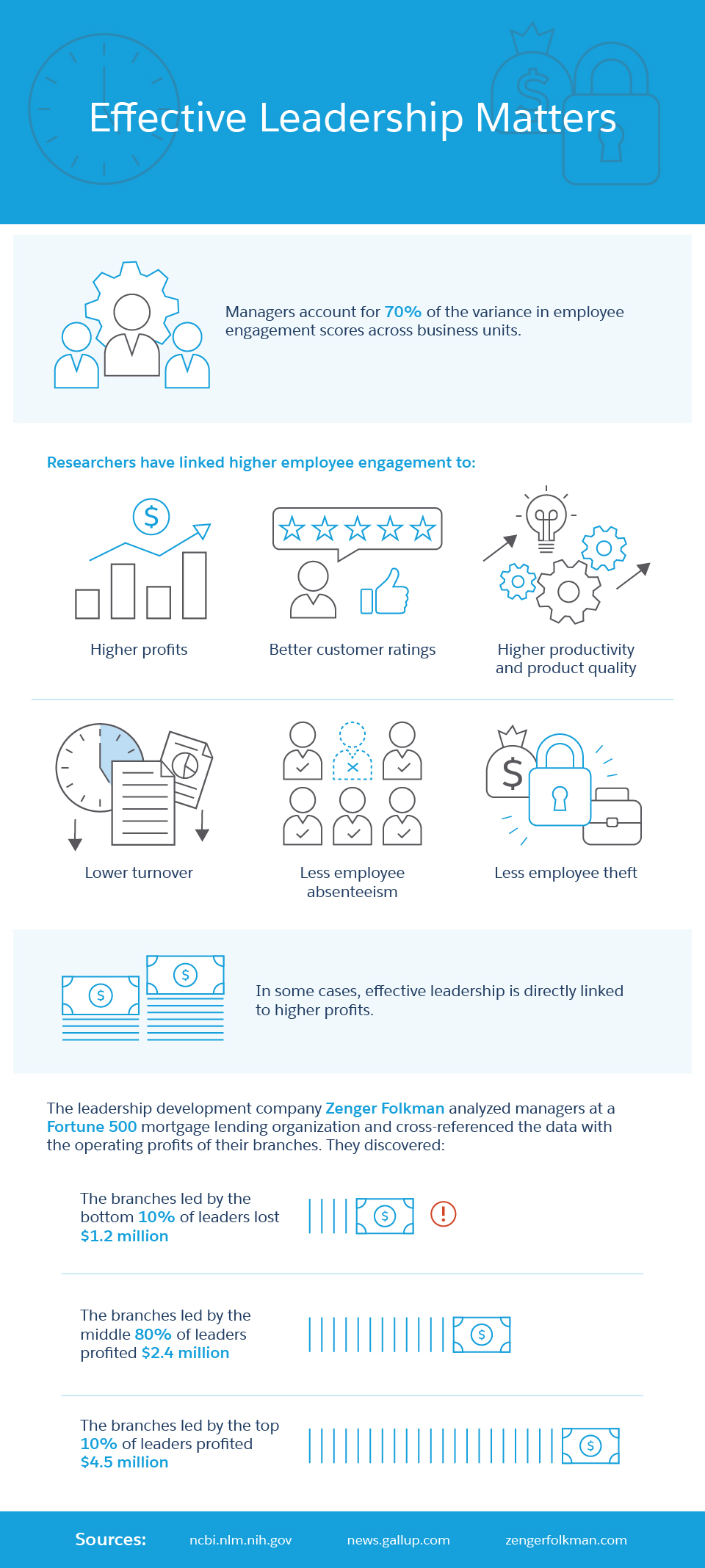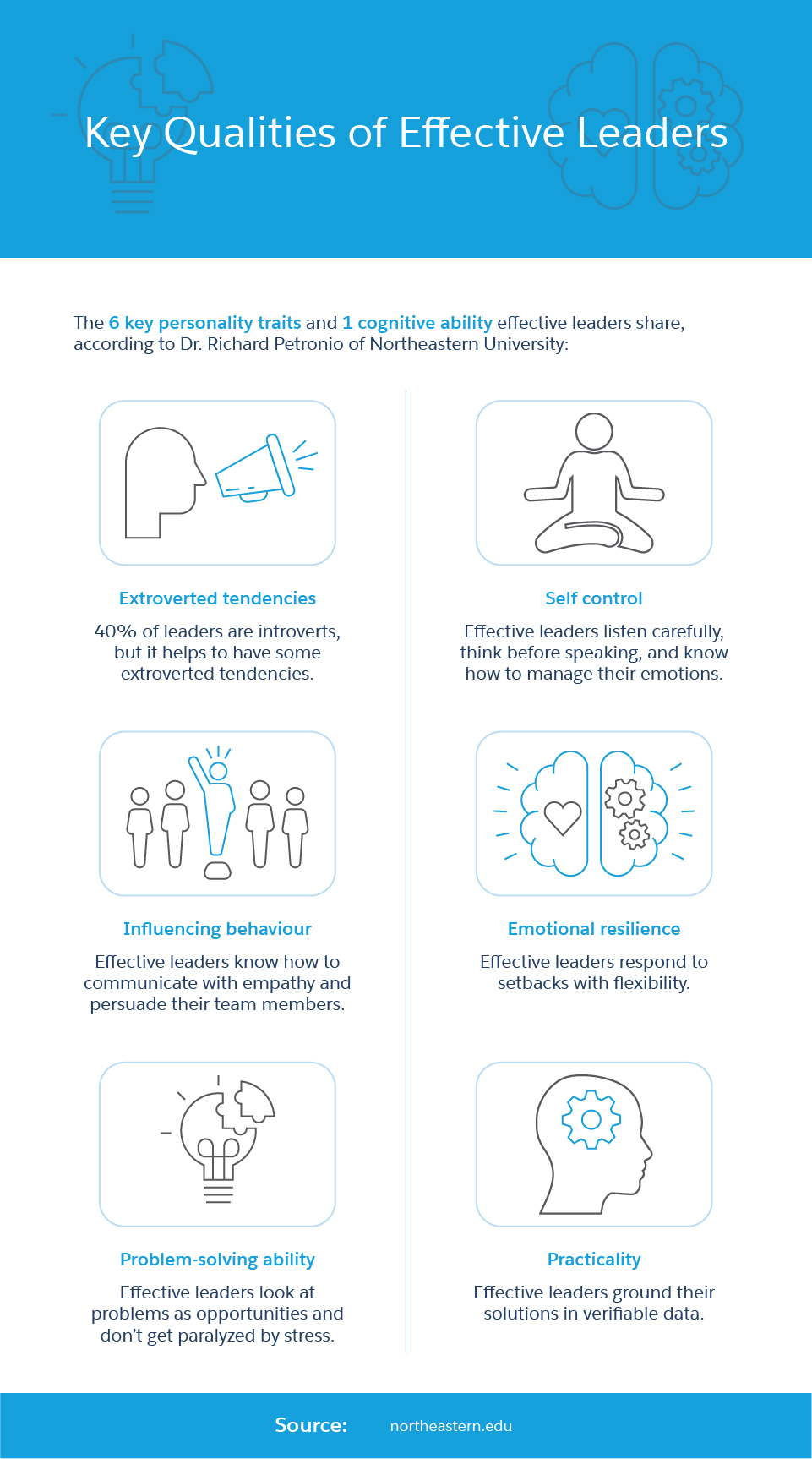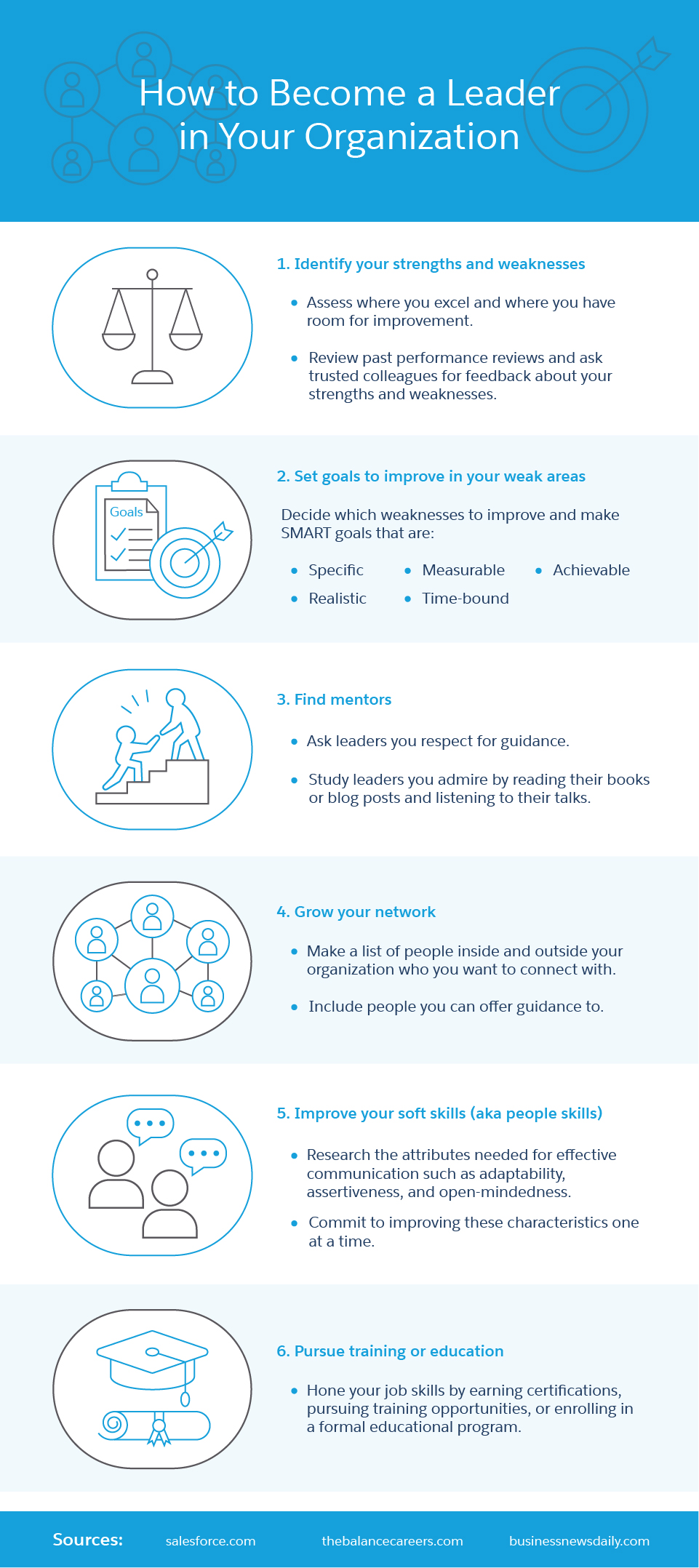What You Need to Do to Become a Leader at Your Company



If you've just started at a new company and you're working in an entry-level or associate role, leadership positions may feel beyond your reach. But it doesn't matter what your personality type is or how much experience you have. With time and effort, you can become a leader. What does it mean to

Salesforce Canada
If you’ve just started at a new company and you’re working in an entry-level or associate role, leadership positions may feel beyond your reach. But it doesn’t matter what your personality type is or how much experience you have. With time and effort, you can become a leader.
What does it mean to be a leader? Research suggests that effective leaders have good communication and team-building skills. They exhibit empathy and emotional intelligence. They’re open-minded and have a continual desire to learn. And they’re willing to take responsibility for team decisions and do what’s best for their organizations.
Quality leadership is essential. Employees who work for effective leaders tend to be more productive and have better morale, which can improve a company’s bottom line. Even though leadership is important, not many organizations invest seriously in their team member’s professional development. That means you may need to take the reins to develop your leadership abilities.
Read on for tips to help grow your leadership skills. Then take action on what you learned. With consistent practice, you’ll become the leader you’ve always known you could be.

How to Become a Leader at Your Organization
Ready to grow your leadership skills and stand out in your organization? Adopt these six practices to become a better leader.
1. Know thyself
Take stock of your strengths and weaknesses and identify what areas you need to improve. Be honest with yourself and acknowledge your shortcomings. Also, solicit and listen to feedback from other people. Analyze past performance reviews and ask a few trusted coworkers to identify your strengths and areas for improvement.
Rank yourself in these key leadership traits.
- Your ability to influence others and inspire them to take action
- Your emotional resilience
- Your ability to make practical, forward-looking decisions
- Your ability to connect and engage with others
- Your ability to keep your ego in check while engaging with others
- Your ability to solve problems
2. Master your challenges
Once you’ve taken stock of your current leadership skill set, identify areas for improvement and set SMART goals to help you improve in those areas. SMART goals are specific, measurable, achievable, realistic, and time-bound. Here are some examples.
- If your empathy skills need work, commit to asking your team members a set number of questions about themselves each week. Note their responses and make decisions with their input in mind.
- If your public speaking skills aren’t up to snuff, set small goals to practice a specific presentation. For instance, first practice your speech in front of a family member, then a friend, then a colleague, and so on. You’ll gradually improve your speaking confidence in the process.
By pushing yourself beyond your comfort zone, you’ll increase your confidence and grow your leadership qualities.

3. Find mentors
Leaders aren’t born in a vacuum; they’re inspired and coached by other leaders.
Study leaders you admire to help you identify which leadership attributes you want to embody. Then practice those qualities to learn what works for you in your workplace.
If possible, seek out a mentor inside or outside your organization who’s willing to offer you guidance in the form of personal check-ins and performance feedback. If a personal mentor is not an option, study leaders you admire by reading their books or blog posts, listening to their talks, and following them on social media.
To get started on your mentor search, make a list of leaders you admire and start following their work. Then reach out to a few people to ask them if they’d be willing to mentor you. But remember, most leaders are busy. Don’t feel hurt if you don’t get responses.
4. Grow your network
A mentor can help you grow your network, which is another important step on the path to leadership. But don’t limit your network to people who are above you on the corporate ladder. Aim to interact with people from all levels of your and other organizations.
Cultivating relationships with a broad variety of people will challenge you to improve your “soft” skills (more on that below), which will make you a more effective communicator. It will expose you to new ideas and perspectives, which can improve your ability to solve problems. And it will help you develop a network of supporters who can offer mentorship, collaboration opportunities, or recommendations as you grow your career.
Not sure how to grow your network? Start by making a list of people inside or outside of your organization who may add value to your career. Also include people you may be able to offer guidance to. (Networking should be mutually beneficial, not a one-way street.) Then, ask those people if they’d like to connect in person or online. The more you practice reaching out to people, the more comfortable it will feel.
5. Improve your soft skills
Soft skills are also referred to as people skills — or the attributes needed for effective interpersonal communication, teamwork, and productivity. These include:
- Adaptability
- Assertiveness
- Conflict resolution
- Conscientiousness
- Creative thinking
- Critical thinking
- Empathy
- Listening skills
- Motivation
- Open mindedness
- Positive attitude
- Team-oriented mindset
- Time management
- Work ethic and drive
Soft skills are more difficult to define than hard skills, which are technical, measurable skills you can acquire through certifications or other training. Examples of hard skills include accounting, using a particular database, and coding.
So how do you improve your soft skills? One strategy is to research each soft skill and practice behaviours that exemplify it. To keep the process manageable, commit to working on each soft skill for a specific period—for instance, three weeks. During that period, focus on modelling one skill in your interactions. For example:
- To grow your communication skills, practice speaking clearly and directly, and encourage others to ask follow-up questions to ensure everybody’s on the same page.
- To grow your listening skills, listen more than you speak and repeat back your understanding of what people say to let them confirm or clarify. Don’t assume you know everything, and keep an open mind about feedback you receive.
- To adopt a positive attitude, be open to change, look for the silver lining in situations, and focus on solutions rather than problems. View challenges as an opportunity to grow or innovate.
6. Pursue training or education
Leaders must expand their knowledge of their industries to make informed decisions for their teams or organizations. This means they need to constantly acquire new skills.
Soft skills are crucial. But leaders must also grow their hard skill set. Even if you don’t have the time or money to pursue a formal degree, commit to developing new skills by earning certifications and pursuing additional training.
Trainings can be profession-specific or skill-specific. For instance, if you’re a salesperson, you may want to look into the Certified Professional Sales Person (CPSP) credential or the Certified Sales Executive (CSE) certification or train in specific software, a la Salesforce’s Trailhead training. Or you may want to earn certifications in areas such as executive leadership from Cornell University or other respectable organizations.

Onward and Upward
At the end of the day, becoming a leader requires you to act like the leader you want to be — regardless of whether you hold a leadership title.
Behave as you would if you were in a leadership role, and you’ll stand out to your peers and management as a person with leadership qualities. You’ll feel more empowered and improve your chances for promotion, and you’ll enrich your company’s culture in the process. And that’s worth doing whether it comes with a salary increase or not.
Share “What You Need to Do to Become a Leader at Your Company” On Your Site



















